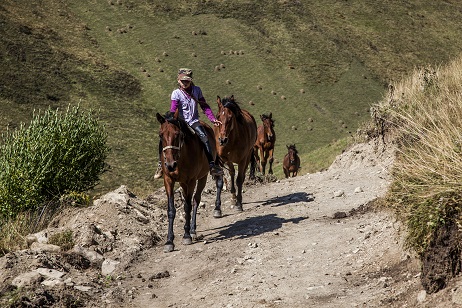EU allocates €3 million to Georgia to develop rural areas

Georgia is starting to establish a rural development policy following the best practices across Europe so the country can provide better rural services and jobs in agriculture, eco-tourism and rural business.
To help Georgia achieve this, the European Union (EU) has provided €3 million (8 million GEL) and launched a new rural development program with Georgia's Ministry of Agriculture.
The program consisted of three pilot projects that would cover Lagodekhi, Kazbegi and Borjomi municipalities, with the new rural development project aiming to increase public participating in civil matters, develop a varied harvest and provide resources to assist overall regional development.

Fields in the village of Juta, the highest populated area in the Stepantsminda district, Georgia. Photo by Nino Alavidze/Agenda.ge.
The program was launched under the EU-funded European Neighbourhood Programme for Agriculture and Rural Development (ENPARD) in the country.
The first part of the project will last for 28 months. Then the project will expand and continue in the future years in other regions of the country.
"Each territory has its own unique features and communities and local authorities need capacities and support to identify and implement their own strategies for development. We came from the very diverse region which is Europe. We have huge experience in developing agriculture and we are glad to share it with Georgia,” said Deputy Head of the EU Delegation to Georgia Carlo Natale.
"We are ready to work with Georgia to establish an effective rural development policy. First of all rural development means better environment and more jobs for local people. The second is that we need active participation of the people who live in the rural areas,” Natale added.
Georgia’s rural population already voiced that they were ready to cooperate with the EU experts and learn about the project idea and the future vision for of their regions.

Juta, the highest populated area in the Stepantsminda district, Georgia. Photo by Nino Alavidze/Agenda.ge.
A Kazbegi resident said: "We are here to help our region and improve the living conditions. We will tell our problems to the programme leaders and share them our ideas about how to solve these problems.”
"EU experts have already helped us. We believed Kazbegi municipality was only good for planting potatoes as our ancestors taught us like this. But now we see it is a good place for planting greens and fruits like strawberries. If we all work together we will develop our region. We already see many people are coming back to their regions as they see the potential now here,” said the resident.
Deputy Minister of Agriculture Nodar Kereselidze said developing Georgia’s agricultural sector was the Government’s main priority.
"But it is not only important to develop agriculture, it is also very vital to develop rural areas. Together with ENPARD we have created specific projects for each region of Georgia. The group has already started to design a concept strategy with the help of EU experts and in 2016 we will have the first draft of the Agriculture Strategy,” Kereselidze said.
The new rural development projects in Lagodekhi, Kazbegi and Borjomi municipalities will help create Local Action Groups (LAGs), consisting of representatives from local authorities, private sector and civil society, who will work together to develop and implement local development strategies.
Implementation of the new projects will be facilitated by three international non-governmental organisations (NGOs) that have recognised experience in rural areas of Georgia; CARE-Austria (Lagodekhi), People in Need-Czech Republic (Kazbegi) and Mercy Corps-Scotland (Borjomi).
Partners of these NGOs have longstanding experience of rural development support in Europe, such as FundacioÌn ETEA of Spain, the National Network of Local Action Groups of the Czech Republic and the Angus Council of Scotland.
In general, Georgia was currently benefitting from €52 million in support to agriculture and rural development through ENPARD.
 Tweet
Tweet  Share
Share